Playing With Fire: Former Donkin Mine Workers Describe Scary Safety Practices

By Elisa Serret and Frances Willick
March 22, 2018 - Former workers at Canada's Donkin coal mine in Cape Breton say the mine is a disaster in waiting, as employees were subjected to dangerous conditions, including ceiling cave-ins, a lack of safety equipment and lax safety practices.
"It's a very dangerous place," said one former miner. "I was scared. I was scared every day that I was going to get killed."
Radio-Canada spoke with three miners who were laid off in November. CBC has agreed not to identify them, as they signed a confidentiality agreement with the company and agreed not to talk to the media.
The risks of working in the mine are well-known in the Glace Bay area, but the topic is taboo. Here, jobs are rare and everybody knows everybody.
Coal mining runs deep in the history of Cape Breton, but the centuries-old industry has been dormant for more than 15 years — until the Donkin mine opened in February 2017, established to tap into a massive coal deposit under the ocean.
Safety Hazards
The miners say there are frequent rockfalls and the ceilings have caved in several times, as the bolts used for support are too short and the roof support in the mining galleries is inadequate.
In one case, the roof collapsed just centimeters in front of a group of miners, they said.
"I am talking rocks the size of trucks, like, pickup trucks, like, massive boulders," said one miner. "If any of them came near you, you would have just been crushed — you know, dead, right there."
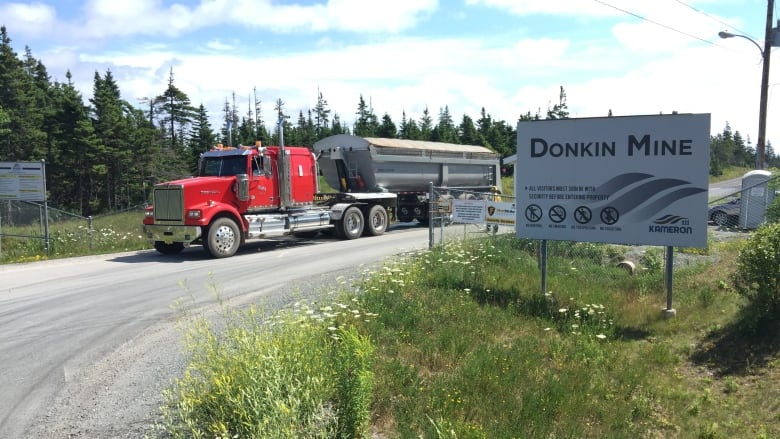
The Donkin mine's two tunnels stretch out about three kilometers under the Atlantic Ocean.
Photo by Radio-Canada
The Donkin mine's two tunnels stretch out about three kilometers under the Atlantic Ocean. Miners say water regularly leaked into the mine.
"We were soaked every night; just the ocean water coming in on us," said one miner. "I remember one time there was a pipe down there just shooting in the ocean water."
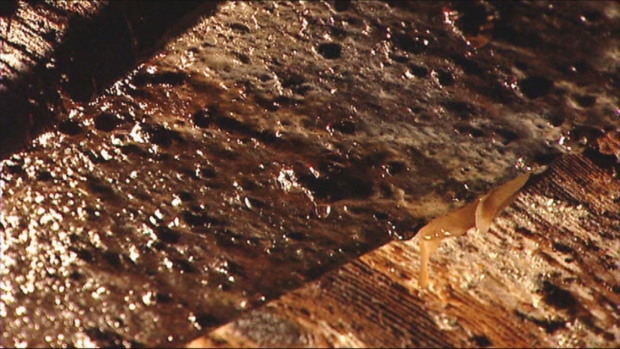
Water drips from a beam in an underground mine.
Photo by CBC
One former employee described how one night, he heard a loud noise and realized the pressure on the roof had caused one of the enormous, five-meter-long roof bolts to blow out.
"We realized that that part of the mine might come in," he said. "That night, it got real.… I looked at my buddies and that, and I said, 'I think we better start heading out, like, toward the exit.'"
The mine has shelters with enough food and air for three days, he said, but "they had it so far away that you would never get to it in time."
"That night, everything, like, I got a feeling in the bottom of my stomach — I said, like, this is actually scary."
Nova Scotia's Labour Department said the mine's emergency shelters are within the required 500 meters.
Lax Safety Enforcement
All three miners said Donkin supervisors pressured employees to speed up production and were lax with enforcing safety standards.
They said workers regularly sprayed concrete onto the walls without masks, which can seriously damage lungs, and supervisors never asked them to wear masks to perform the task.
Supervisors also did not require workers to wear a harness when climbing a ladder, they said. Several workers have fallen and a few of those falls resulted in concussions, they said. Their bosses never advised them to see a doctor.
"It was productivity over safety," said one miner. "They wanted that coal out. They didn't care who got hurt or nothing like that."
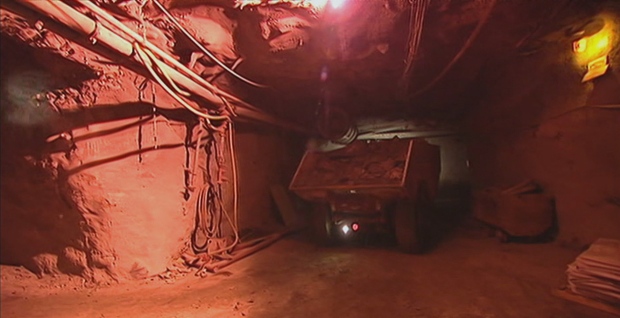
A machine works in an underground mine.
Photo by CBC
Cutting coal releases methane and dust, a highly explosive mix, which is why stringent safety regulations are often in place. The former miners were alarmed they were routinely required to cut steel underground without the necessary permit.
Cutting steel produces sparks, which could ignite methane gas.
One miner said workers carried out that task without a methane detector or fire extinguisher nearby.
"This is almost a criminal act," said Gary Taje, of the United Mine Workers of America, which does not represent employees at the non-unionized Donkin mine. "This endangers the life of every miner in that mine. There is no other way to say it: this is playing with fire."
Parallels with Westray
Lawyer David Roberts believes there are troubling parallels between what the former Donkin miners describe and the conditions that led to the Westray explosion.
Twenty-six men were killed in an underground explosion at the Westray coal mine in Plymouth, N.S., in 1992 — a tragedy that shocked the entire country.
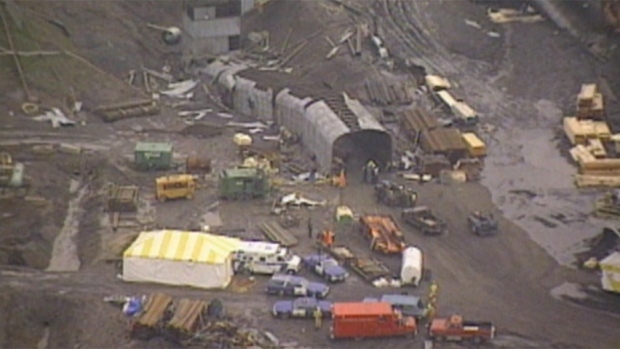
Twenty-six men died when the Westray coal mine in Nova Scotia exploded on May 9, 1992.
Photo by CBC
Roberts remembers those days all too vividly. He represented surviving Westray miners at a public inquiry into the incident in 1997.
The inquiry found the mine was managed in a negligent manner and the disaster would have been avoided if management had complied with safety standards. The inquiry also confirmed the cause of the fatal explosion was a single spark that ignited methane gas.
No one was convicted for the Westray explosion.
During the five-month inquiry, Roberts outlined how Westray employees were intimidated into increasing production.
"You can never guarantee any workplace accident not happening," he said. "But what you can do is bring in the controls, the precautions, that are well known and instil a safety culture from the top down and then follow it."

David Roberts represented surviving miners at the inquiry into the Westray explosion.
Photo by Radio-Canada
The miners say they worry about the possibility of fatalities at the mine.
"It's always on the back of our minds," said one man. "It's really quiet when we're in those machines heading down to the mine. When we're coming out, everybody's laughing and joking. The shift is over, everyone's kind of relieved — we're out for another one.
"You start thinking of Westray and stuff like that, right? You never know when you're going in there if it's going to be your last shift."
Another miner said he is less concerned about the potential for an explosion than he is about inexperienced workers being killed by machinery. "I think it's going to be lack of knowledge and human error that's going to cause a lot of, if anybody gets hurt or killed."
Promises of Jobs
The Donkin mine opened in February 2017 with promises of 300 jobs at peak production. The workers interviewed by Radio-Canada hoped to improve their lives with good, stable jobs in a region of high unemployment.
"I was very excited. I was very proud," said one miner. "To get a job like that with that kind of pay in Cape Breton, I mean, like, it was amazing…. That basically changed my life right there."
.jpg)
The Donkin coal mine opened at the end of February 2017.
Photo by Radio-Canada
But only nine months after opening, 49 workers — one-third of the workforce — were laid off. At the time, the company said it encountered more challenging conditions underground than expected and new equipment would be required.
Two of the three former miners said they believe they were let go because they complained of unsafe conditions in the mine.
"The reason I'm terminated is because I spoke up about safety a lot," said one man. "I'll bet my life on it that that's why I was let go."
.jpg)
Gary Taje is the international staff representative of the United Mine Workers of America.
Photo by Radio-Canada
None of mine owner Chris Cline's mines are unionized. The former miners who spoke with Radio-Canada said they were told any attempts to unionize would end in failure.
"They said they'll close her down. Cline, who owns the company, he'll close her down, he'll lock the gate and then open it up another year and then hire a bunch of different people."
Provincial Inspections
The province has conducted 26 inspections at Donkin between when the mine opened at the end of February 2017 and mid-February 2018. According to the Labor Department, the mine committed 31 infractions and received 63 warnings.
"A lot of the violations … it's minor things, but it's things that should be nipped in the bud right away," said one miner.
The mine was ordered to stop production just once, for a few hours, because of a ventilation issue.
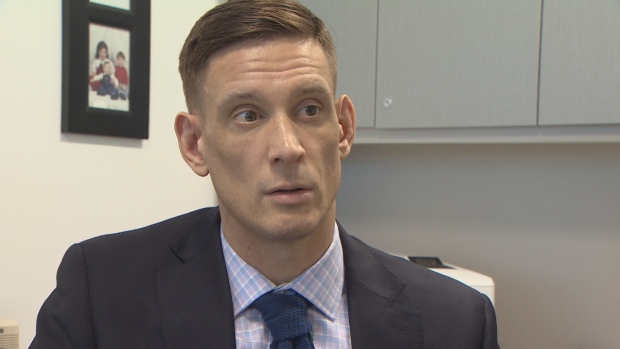
Scott Nauss is the Labour Department's senior director of inspection and compliance.
By Patrick Callaghan, CBC
After Radio-Canada brought the former miners' concerns to the department, inspectors carried out two additional inspections to try to verify the claims.
Scott Nauss, the Labor Department's senior director of inspection and compliance, said they did not detect any evidence of the hazards, although four additional warnings were issued as a result of the second inspection.
Mine officials get advanced notice for about half of all inspector visits.
Nauss said since it takes about half an hour to travel from above ground to the working face of the mine, it's possible employees underground could get wind of an unannounced inspection and cover up any violations. But that's not likely, he said.
"If unsafe practices have been taking place for days or hours, it's very unlikely that the situation can be remedied that quickly.… Quite often, evidence remains after the fact."
Nauss said major problems such as injured workers, cave-ins or significant leaks of ocean water should be reported to the department by the company. No such reports have been made, he said.
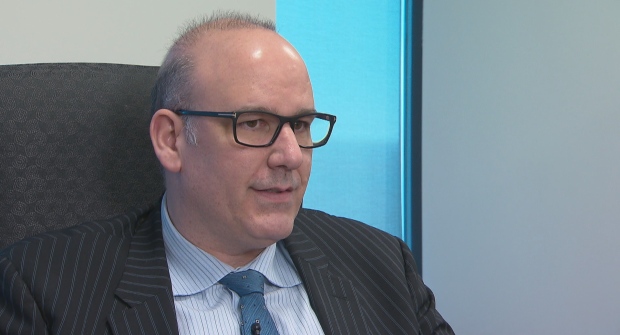
Labi Kousoulis is the minister of the provincial Labour and Advanced Education Department.
Photo by Radio-Canada
Labor Minister Labi Kousoulis said he's never heard of the concerns raised by the former miners. He said mine management has been cooperative, seems to take safety seriously, and has dealt with any problems flagged by the department within the appropriate time frame.
He urged employees to call the province's anonymous workplace safety line, 1-800-952-2687, to report concerns.
"We can't investigate what we don't know," he told Radio-Canada. "So it's great that they're talking to you, but if the health and safety inspectors who can actually shut the mine down if it's unsafe, if they're not aware of any infractions, then it's not getting to the right person."
Donkin mine management declined Radio-Canada's request for an interview, but in an emailed statement, the vice-president said safe production was the company's No. 1 priority.
CoalZoom.com - Your Foremost Source for Coal News

